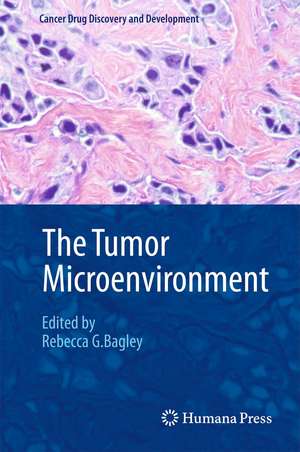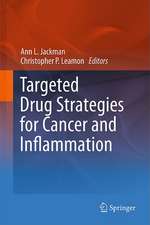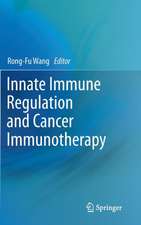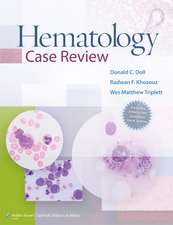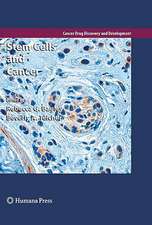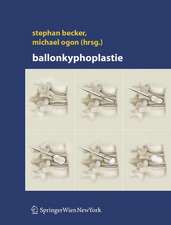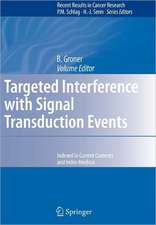The Tumor Microenvironment: Cancer Drug Discovery and Development
Editat de Rebecca G. Bagleyen Limba Engleză Paperback – 6 noi 2012
| Toate formatele și edițiile | Preț | Express |
|---|---|---|
| Paperback (1) | 1436.57 lei 43-57 zile | |
| Springer – 6 noi 2012 | 1436.57 lei 43-57 zile | |
| Hardback (1) | 1443.13 lei 43-57 zile | |
| Springer – 9 sep 2010 | 1443.13 lei 43-57 zile |
Din seria Cancer Drug Discovery and Development
- 5%
 Preț: 1474.98 lei
Preț: 1474.98 lei - 5%
 Preț: 1108.35 lei
Preț: 1108.35 lei - 5%
 Preț: 1415.75 lei
Preț: 1415.75 lei - 5%
 Preț: 1370.19 lei
Preț: 1370.19 lei - 5%
 Preț: 1452.28 lei
Preț: 1452.28 lei - 5%
 Preț: 1316.74 lei
Preț: 1316.74 lei - 5%
 Preț: 1439.50 lei
Preț: 1439.50 lei - 5%
 Preț: 1113.63 lei
Preț: 1113.63 lei - 5%
 Preț: 1126.24 lei
Preț: 1126.24 lei - 24%
 Preț: 1037.59 lei
Preț: 1037.59 lei - 5%
 Preț: 1466.37 lei
Preț: 1466.37 lei - 5%
 Preț: 1350.78 lei
Preț: 1350.78 lei - 5%
 Preț: 1417.54 lei
Preț: 1417.54 lei - 5%
 Preț: 1113.46 lei
Preț: 1113.46 lei - 5%
 Preț: 1428.54 lei
Preț: 1428.54 lei - 5%
 Preț: 1429.80 lei
Preț: 1429.80 lei - 5%
 Preț: 782.10 lei
Preț: 782.10 lei - 5%
 Preț: 1438.58 lei
Preț: 1438.58 lei - 5%
 Preț: 1110.32 lei
Preț: 1110.32 lei - 5%
 Preț: 1434.39 lei
Preț: 1434.39 lei - 5%
 Preț: 1365.82 lei
Preț: 1365.82 lei - 5%
 Preț: 1461.08 lei
Preț: 1461.08 lei - 5%
 Preț: 1106.86 lei
Preț: 1106.86 lei - 5%
 Preț: 982.18 lei
Preț: 982.18 lei - 5%
 Preț: 727.80 lei
Preț: 727.80 lei - 5%
 Preț: 1331.76 lei
Preț: 1331.76 lei - 5%
 Preț: 1297.40 lei
Preț: 1297.40 lei - 5%
 Preț: 1124.59 lei
Preț: 1124.59 lei - 5%
 Preț: 1433.10 lei
Preț: 1433.10 lei - 5%
 Preț: 1110.90 lei
Preț: 1110.90 lei - 5%
 Preț: 1317.76 lei
Preț: 1317.76 lei - 5%
 Preț: 1464.91 lei
Preț: 1464.91 lei - 5%
 Preț: 1939.63 lei
Preț: 1939.63 lei - 5%
 Preț: 1418.48 lei
Preț: 1418.48 lei - 5%
 Preț: 1438.94 lei
Preț: 1438.94 lei - 5%
 Preț: 1100.30 lei
Preț: 1100.30 lei - 5%
 Preț: 1109.96 lei
Preț: 1109.96 lei - 5%
 Preț: 990.58 lei
Preț: 990.58 lei - 5%
 Preț: 1443.13 lei
Preț: 1443.13 lei - 5%
 Preț: 1428.91 lei
Preț: 1428.91 lei - 5%
 Preț: 787.58 lei
Preț: 787.58 lei - 5%
 Preț: 1311.72 lei
Preț: 1311.72 lei - 5%
 Preț: 1331.76 lei
Preț: 1331.76 lei - 5%
 Preț: 1113.11 lei
Preț: 1113.11 lei - 5%
 Preț: 1440.76 lei
Preț: 1440.76 lei
Preț: 1436.57 lei
Preț vechi: 1512.18 lei
-5% Nou
Puncte Express: 2155
Preț estimativ în valută:
274.88€ • 287.77$ • 227.45£
274.88€ • 287.77$ • 227.45£
Carte tipărită la comandă
Livrare economică 07-21 aprilie
Preluare comenzi: 021 569.72.76
Specificații
ISBN-13: 9781461426608
ISBN-10: 146142660X
Pagini: 788
Ilustrații: XVIII, 770 p.
Dimensiuni: 155 x 235 x 41 mm
Greutate: 1.08 kg
Ediția:2010
Editura: Springer
Colecția Humana
Seria Cancer Drug Discovery and Development
Locul publicării:New York, NY, United States
ISBN-10: 146142660X
Pagini: 788
Ilustrații: XVIII, 770 p.
Dimensiuni: 155 x 235 x 41 mm
Greutate: 1.08 kg
Ediția:2010
Editura: Springer
Colecția Humana
Seria Cancer Drug Discovery and Development
Locul publicării:New York, NY, United States
Public țintă
ResearchCuprins
Physiological Parameters.- Combination Strategies Targeting Hypoxia Inducible Factor 1 (HIF-1) for Cancer Therapy.- The Tumor Microenvironment: New Insights into Regulation of Tumor pH by Carbonic Anhydrases.- Hypoxia, Gene Expression, and Metastasis.- Molecular Mechanisms Regulating Expression and Function of Cancer-Associated Carbonic Anhydrase IX.- Glycolytic Pathway as a Target for Tumor Inhibition.- Malignant Cells.- Aberrant DNA Methylation in Cancer Cells.- DNA Repair and Redox Signaling.- Cancer Stem Cells and Microenvironment.- Epithelial–Mesenchymal Transition in Development and Diseases.- Invasion and Metastasis.- Dormancy of Disseminated Tumor Cells: Reciprocal Crosstalk with the Microenvironment.- Vasculature And Stroma.- Impact of Endothelial Progenitor Cells on Tumor Angiogenesis and Outcome of Antiangiogenic Therapy: New Perspectives on an Ongoing Controversy.- Bone Marrow Derived Mesenchymal Stem/Stromal Cells and Tumor Growth.- Integrin Signaling in Lymphangiogenesis.- Role of Pericytes in Resistance to Antiangiogenic Therapy.- Tumour-Promoting Stromal Myofibroblasts in Human Carcinomas.- Immune-Mediated Cells.- Mast Cells and Tumor Microenvironment.- Macrophages in the Tumor Microenvironment.- The Prognostic Significance of Tumor-Infiltrating Lymphocytes.- The Pro-inflammatory Milieu and Its Role in Malignant Epithelial Initiation.- Natural Killer Cells for Adoptive Immunotherapy.- Extracellular Matrix.- Fibronectin.- Collagen in Cancer.- Integrins and Cancer.- Matrix Metalloproteinases and Cancer Cell Invasion/Metastasis.- Tetraspanins and Cancer Metastasis.- Secreted Proteins.- Chemokines and Metastasis.- Transforming Growth Factor-? in Lung Cancer, Carcinogenesis, and Metastasis.- Cooperative Interactions Between Integrins and Growth FactorSignaling in Pathological Angiogenesis.- The Extracellular Matrix and the Growth and Survival of Tumors.- Secreted Growth Factors as Therapeutic Targets.- Adrenomedullin.
Notă biografică
Rebecca Bagley is a senior scientist at Genzyme Corporation and has worked in the biotechnology industry for 20 years with degrees in biology from Wellesley College and Harvard University. Her expertise in drug development spans a wide range of approaches including immunotherapies, gene and protein therapies, and small molecule delivery with publications in journals such as Molecular Cancer Therapeutics, Cancer Research, and Microvascular Research . Her current research focuses on stem cells, tumor vasculature, and target validation.
Textul de pe ultima copertă
The field of cancer biology and developmental therapeutics is continually evolving as new methodologies are developed and new targets are discovered. Although multiple therapeutics directly target the malignant cells these drugs rarely prevent recurrence of disease or the progression of metastasis. The complex biology of tumors presents challenges in designing treatments that will eliminate the malignant cells as well as the supporting network of vasculature and stroma that allows for the comparison of tumors to developing organs in embryos. In addition to blood vessels and malignant cells, tumors consist of fibroblasts, immune and inflammatory cells, and a myriad of proteins that comprise the extracellular matrix. Effective eradication of malignant disease requires therapeutic strategies that factor in targeting the tumor microenvironment. In the past decade, a new class of anticancer drugs has emerged that interferes with tumor angiogenesis; however the clinical benefit from treatment with the first generation antiangiogenic agents added to the standard of care is often modest. Thus, there remains a critical need to understand the tumor microenvironment and to develop anti-cancer therapies that address this aspect of malignant disease.The first edition of The Tumor Microenvironment is intended to give a current perspective on the role of the tumor microenvironment in malignant progression and detail strategies for novel therapies directed towards the cellular matrix. This book explores the many biological and physiological aspects of the tumor as a tissue and includes chapters on the variety of cells that influence tumor growth and spread as well as the cell-associated and soluble proteins that can promote invasion and metastasis. Several chapters describe endothelial cells and pericytes that form tumor vasculature. Insights into the role of progenitor and stem cells are included. The contribution of the supporting stroma is addressed in addition to cell-cell signaling and cell-matrix interactions. Additional chapters describe the influence of infiltrating cells of the immune system on tumor growth. The Tumor Microenvironment is the definitive text detailing cutting edge research by experts in the field and will be a valued resource in the study of this important area of cancer biology for many years to come.
Caracteristici
Explains role of the tumor microenvironment as dramatically influencing the course of tumor development and dissemination Represents a superb compilation of the latest thoughts and data regarding the role of each essential component of the tumor microenvironment In-depth chapters written by known professionals in the field
